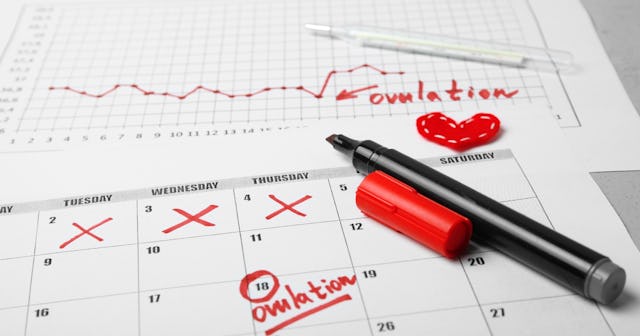Here's When You're Most Likely — And Least Likely — To Get Pregnant

If you’re looking to get pregnant and want to know when you should be getting busy to increase your chances of having a baby, guess what? There are better times of the month to conceive than others. You probably know that when you’re ovulating is a great time to conceive, but did you know your chances of getting pregnant are a little better at the beginning of ovulation? Or that right after your period is a great time to slide into the sheets and start the baby-making process? Of course, if you’re not trying to have a baby, this guide to when you can get pregnant is equally as valuable — so you can be extra careful during the times you’re most likely to conceive.
RELATED: Pregnancy Due Date Calculator: When Is Your Baby’s Expected Due Date?
What are the chances of getting pregnant without protection?
Depending on when you have unprotected sex, you could have a high chance of getting pregnant. Condoms are about 85 percent effective, and a birth control pill for women, on average, is about 99 percent effective. By removing all these barriers, you’re opening yourself up for a much greater chance of pregnancy. The highest chance of getting pregnant is during ovulation. The best way to know when you’re the most fertile is to track your ovulation via symptoms or ovulation kits and speak with your doctor. Your doctor will be able to guide you toward figuring out the best plan to conceive — then comes the fun part of practicing.
What are the chances of getting pregnant on your period?
It’s pretty unlikely that you’ll get pregnant while you’re on your period. When you’re on your period, your body is stripping the inner lining of your uterus — the endometrium — off, which creates menstrual bleeding. During this process, your estrogen is low, and egg-filled follicles begin to form in your uterus. It’s not until late in your period that your hormones start to return to normal. It’s because there aren’t any eggs to work with during your period that makes it unlikely for you to get pregnant at this time — but it could happen. Keep a close eye on your ovulation, as this is the marker of when you’re likely to get pregnant.
The chances of getting pregnant right after your period, though, are higher. Though you won’t be ovulating quite yet, sperm can live for up to five days in the body, which means if you have sex right after you finish your period, that sperm can potentially survive long enough to catch an egg when you start ovulating. If getting pregnant is your intention, having sex right after your period is a great time to go for it.
What are the chances of getting pregnant on ovulation day?
Ovulation day is prime time for conceiving. If you’re tracking ovulation — which is helpful when trying to get pregnant — you’ll be able to detect the rise in luteinizing hormone. This shift in hormones happens just before you start to ovulate, so it’s your heads up that the time is right. Your body temperature also rises ever so slightly during ovulation, which is another clue that it’s time. Still, an ovulation kit that measures luteinizing hormone is a bit more reliable because it clues you in on ovulation earlier than your temperature does.
The chances of getting pregnant while you’re ovulating are high as long as you and your partner are in good health and don’t have underlying issues that could lower your chances of getting pregnant. Ovulation is the process during which your eggs release and wait for sperm — but they don’t live long. Those eggs live about 12 hours, so frequent sex (daily if you’d like) during ovulation will up your chances of having the sperm find the eggs.
What are the chances of getting pregnant from precum?
While precum is typically just lubricating pre-ejaculate, it can contain sperm — though it’s unlikely. The actual precum isn’t made of sperm, but sometimes when it comes out, some sperm come out with it. The chances of getting pregnant from precum are very slim, but it’s not zero percent. If you want to avoid an unplanned pregnancy, it’s best to use protection and avoid intercourse during your most fertile days.
What are the chances of sperm going through underwear and getting you pregnant?
A person can become pregnant if ejaculate or pre-ejaculate enters the vagina. So, if you and your partner are dry humping and they cum, the ejaculate can soak through their underwear and into yours. Although it’s unlikely for that semen to seep into your vagina to cause pregnancy, it is possible.
Can you get pregnant three days before ovulation?
Typically, the five days before ovulation is the best time to get pregnant, with better chances the closer you get to ovulation; which means you are also fertile during the three days leading up to ovulation. If you have sex during this time, you have a very good chance of getting pregnant. Remember, sperm can survive in the uterus for three to five days, which can help you efficiently plan intercourse.
Does your chance of getting pregnant increase by how the amount of ejaculate?
The amount of ejaculate that enters the vagina does affect the chance of fertilization. Although it only takes one sperm to make it happen, there are millions of sperm in an ejaculation that never reach the egg. There are about 15 million sperm in a millimeter of semen, and the more ejaculate released, the better chance of pregnancy.
This article was originally published on